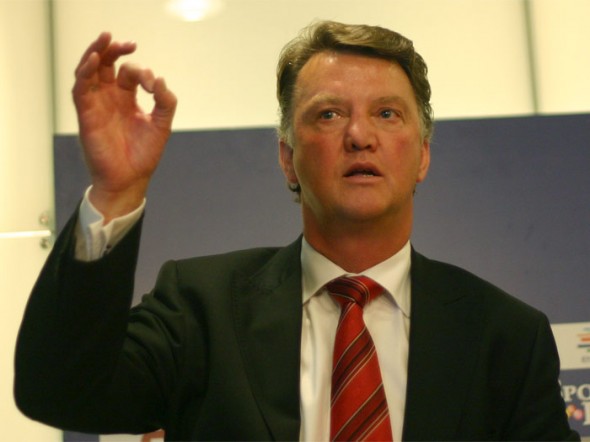Aloysius Paulus Maria Van Gaal. The former Ajax B team player, who enjoyed successful spells in Holland with Sparta Rotterdam and AZ Alkmaar, is now manager of one of the world’s biggest clubs, Manchester United. Van Gaal is a man who has divided opinions with a strong personality and distinct ideas about football. Van Gaal: household name, managerial genius, and provocative personality, with football knowledge second to none.

Then to Now: A look at Van Gaal’s Stellar Career
This knowledge, or as Van Gaal would call it his ‘philosophy’, has enabled the Dutchman to achieve success throughout Europe. As the manager of Ajax, he reinvigorated the idea of total football while winning three Dutch titles, the UEFA Super Cup and most notably lifting the UEFA Champions League in 1995. That he did this by nurturing young talents and future greats such as Clarence Seedorf, Edgar Davies and Patrick Kluivert from the academy system also established Van Gaal’s reputation as a believer in youth.
This spell served as the zenith of Van Gaal’s career, while the controversial and stubborn Dutchman has enjoyed both highs and lows elsewhere. He won two La Liga titles and a Copa Del Rey during two tumultuous spells at Barcelona, for example, while also being derided for a ‘slow’ and ‘methodical’ style of play that alienated stars such as the brilliant Brazilian Rivaldo. This tactical inflexibility was also evident at Bayern Munich, where a domestic double and a losing Champions League final appearance in 2010 were followed by Van Gaal’s dismissal the following year.
Exploring Van Gaal’s Philosophy and what it means for Man United
After leading the Dutch national team to third place in the 2014 World Cup, however, Van Gaal has re-emerged as a managerial heavyweight in the European game. It was this that prompted Manchester United to appoint him as the successor to David Moyes, although more than a year into his tenure many fans of the club remain confused about the true nature of the manager’s ‘philosophy’. Recent events in the transfer market have hardly helped, nor has a disappointing 2-1 reversal at Swansea in the last round of league fixtures.
From a positive perspective, Van Gaal has made United much more comfortable in possession than they were under Moyes, while they have also improved the squad by attracting a better calibre of players. While all of the Dutchman’s teams have been notoriously slow starters, Van Gaal will claim that this is a necessary period of transition as players adapt to his philosophy and playing style, which revolves around controlled possession, short bursts of triangular passing patterns and predetermined forward movements that are designed to move defenders out of position.
This seemed to bear fruit at the end of last season, as Van Gaal’s side evolved from a cumbersome interpretation of the 3-5-2 system to deploy a classic 4-3-3 variation from April onwards. This coincided with the team’s best and most consistent form of the season, as United showcased pace and precision in the final third while also finding roles for Wayne Rooney, the elusive Juan Mata and the polarising Marouanne Fellaini. Given that Van Gaal has also added some stardust to the first team squad and helped the club return to the Champions League, his reign so far and the implementation of his philosophy must be considered in context.
The Flip-side
Despite this, many fans have concerns about Van Gaal’s so-called philosophy and approach to man-management. In terms of the former, Van Gaal occasionally gives the impression of being too rigid, while at other times he appears to lacks clarity and vision. His deployment of creative players offers an example of this, especially after Angel Di Maria’s failure at United and Nani’s exclusion from the side. Rivaldo also fell afoul of Van Gaal’s positional rigidity and training methods at Barcelona, as the manager’s demand for tactical awareness and defensive work tended to stifle flair and talented dribblers.
If this underlines the manager’s rigid approach, however, his use of formations and transfer market activity suggests the lack of a clear, long-term plan. Changing from last year’s successful 4-3-3 to a more rigid 4-2-3-1 (Van Gaal’s preferred system) offers a clear example of this, as the Dutchman still seems tentative when it comes to optimising the attacking talent at his disposal. His decision to release Robin Van Persie, Radamel Falcao and Javier Hernandez has also raised eyebrows, with only the unproven Anthony Martial brought in to strengthen the attack and Wayne Rooney continuing to struggle for form.
In terms of man-management, Van Gaal also faces challenges in the months ahead. Van Gaal’s “It must be my way or no way” approach is often cited by the Dutchman’s former players, and it is a part of his philosophy in which everything is structured from top to bottom. Players wear the same attire, eat together, and arrive on time to every meeting. It is a ‘we’ and not ‘I’. The goal is to achieve success together and this systematic approach cascades throughout the club. The David De Gea disaster and his unnecessary alienation of Victor Valdes has underlined how this can go wrong, however, and left the manager with some bridges to build during the international break.
The Future for Van Gaal and Manchester United
While Van Gaal’s philosophy may be unclear in some sense, he clearly has an internal vision and an understanding of where he would like to take the club. He has also elevated the fortunes of the club since last year, when the club has just recorded a record-low seventh place finish and were out of Europe entirely. With a far better squad and Champions League football to look forward to, the manager is clearly leading the club upwards and towards the attainment of goals.
History says it will take some time, however, and this is something that cannot be ignored. Van Gaal’s knowledge and commitment is clear. So too his philosophy in most aspects, and he must remain true to this if he is to optimise the talent at his disposal and lead United to a successful season.









